10 start with H start with H
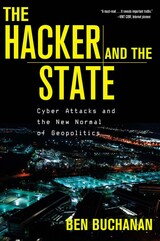
“A must-read…It reveals important truths.”
—Vint Cerf, Internet pioneer
“One of the finest books on information security published so far in this century—easily accessible, tightly argued, superbly well-sourced, intimidatingly perceptive.”
—Thomas Rid, author of Active Measures
Cyber attacks are less destructive than we thought they would be—but they are more pervasive, and much harder to prevent. With little fanfare and only occasional scrutiny, they target our banks, our tech and health systems, our democracy, and impact every aspect of our lives. Packed with insider information based on interviews with key players in defense and cyber security, declassified files, and forensic analysis of company reports, The Hacker and the State explores the real geopolitical competition of the digital age and reveals little-known details of how China, Russia, North Korea, Britain, and the United States hack one another in a relentless struggle for dominance. It moves deftly from underseas cable taps to underground nuclear sabotage, from blackouts and data breaches to election interference and billion-dollar heists.
Ben Buchanan brings to life this continuous cycle of espionage and deception, attack and counterattack, destabilization and retaliation. Quietly, insidiously, cyber attacks have reshaped our national-security priorities and transformed spycraft and statecraft. The United States and its allies can no longer dominate the way they once did. From now on, the nation that hacks best will triumph.
“A helpful reminder…of the sheer diligence and seriousness of purpose exhibited by the Russians in their mission.”
—Jonathan Freedland, New York Review of Books
“The best examination I have read of how increasingly dramatic developments in cyberspace are defining the ‘new normal’ of geopolitics in the digital age.”
—General David Petraeus, former Director of the CIA
“Fundamentally changes the way we think about cyber operations from ‘war’ to something of significant import that is not war—what Buchanan refers to as ‘real geopolitical competition.’”
—Richard Harknett, former Scholar-in-Residence at United States Cyber Command
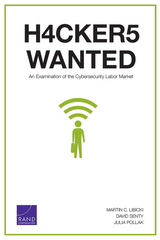

Are nuclear arsenals safe from cyber-attack? Could terrorists launch a nuclear weapon through hacking? Are we standing at the edge of a major technological challenge to global nuclear order? These are among the many pressing security questions addressed in Andrew Futter’s ground-breaking study of the cyber threat to nuclear weapons.
Hacking the Bomb provides the first ever comprehensive assessment of this worrying and little-understood strategic development, and it explains how myriad new cyber challenges will impact the way that the world thinks about and manages the ultimate weapon. The book cuts through the hype surrounding the cyber phenomenon and provides a framework through which to understand and proactively address the implications of the emerging cyber-nuclear nexus. It does this by tracing the cyber challenge right across the nuclear weapons enterprise, explains the important differences between types of cyber threats, and unpacks how cyber capabilities will impact strategic thinking, nuclear balances, deterrence thinking, and crisis management. The book makes the case for restraint in the cyber realm when it comes to nuclear weapons given the considerable risks of commingling weapons of mass disruption with weapons of mass destruction, and argues against establishing a dangerous norm of “hacking the bomb.”
This timely book provides a starting point for an essential discussion about the challenges associated with the cyber-nuclear nexus, and will be of great interest to scholars and students of security studies as well as defense practitioners and policy makers.

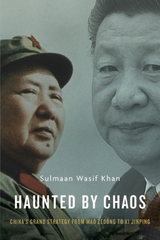
An American Interest Top Book of the Year
“Khan has unraveled the mystery of Chinese grand strategy, showing why insecurity lies at the root of Chinese power projection… Readers will not find a shrewder analysis as to why the Chinese act as they do.”
—Robert D. Kaplan, author of The Revenge of Geography
Before the Chinese Communist Party came to power, China lay broken and fragmented. Today it is a force on the global stage, and yet its leaders have continued to be haunted by the past. Drawing on an array of sources, Sulmaan Wasif Khan chronicles the grand strategies that have sought not only to protect China from aggression but also to ensure it would never again experience the powerlessness of the late Qing and Republican eras.
The dramatic variations in China’s modern history have obscured the commonality of purpose that binds the country’s leaders. Analyzing the calculus behind their decision making, Khan explores how they wove diplomatic, military, and economic power together to keep a fragile country safe in a world they saw as hostile. Dangerous and shrewd, Mao Zedong made China whole and succeeded in keeping it so, while the caustic, impatient Deng Xiaoping dragged China into the modern world. Jiang Zemin and Hu Jintao served as cautious custodians of the Deng legacy, but the powerful and deeply insecure Xi Jinping has shown an assertiveness that has raised both fear and hope across the globe.
For all their considerable costs, China’s grand strategies have been largely successful. But the country faces great challenges today. Its population is aging, its government is undermined by corruption, its neighbors are arming out of concern over its growing power, and environmental degradation threatens catastrophe. A question Haunted by Chaos raises is whether China’s time-tested approach can respond to the looming threats of the twenty-first century.
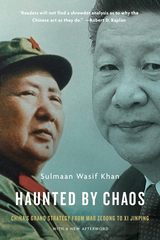
An American Interest Book of the Year
“Readers will not find a shrewder analysis as to why the Chinese act as they do.”
—Robert D. Kaplan
“An outstanding contribution to our understanding of that most urgent of contemporary geopolitical questions: what does China want?”
—Rana Mitter
Before the Chinese Communist Party came to power, China lay broken and fragmented. Today it dominates the global stage, and yet its leaders have continued to be haunted by the past. Analyzing the calculus behind decision making at the highest levels, Sulmaan Wasif Khan explores how China’s leaders have harnessed diplomatic, military, and economic power to keep a fragile country safe in a hostile world. At once shrewd and dangerous, Mao Zedong made China whole and succeeded in keeping it so while the caustic Deng Xiaoping dragged China into the modern world. Jiang Zemin and Hu Jintao were cautious custodians of Deng’s legacy, but Xi Jinping has shown a mounting assertiveness that has raised concern across the globe.
China’s grand strategies, while costly, have been largely successful. But will this time-tested approach be enough to tackle the looming threats of our age?
“Written with verve and insight, this will become the go-to book for anyone interested in the foundations of China’s grand strategy under Communist rule.”
—Odd Arne Westad, author of The Cold War
“Khan’s brilliant analysis will help policymakers understand the critical rise of China…Crucial if we are to avoid conflict with this emerging superpower.”
—Admiral James Stavridis, former Supreme Allied Commander of NATO
“Khan argues that since before the People’s Republic of China’s founding, Chinese rulers have held remarkably consistent objectives, even as their definition of security has expanded.”
—Mira Rapp-Hooper, War on the Rocks

Hezbollah: The Global Footprint of Lebanon's Party of God is the first thorough examination of Hezbollah’s covert activities beyond Lebanon’s borders, including its financial and logistical support networks and its criminal and terrorist operations worldwide.
Hezbollah—Lebanon’s "Party of God"—is a multifaceted organization: It is a powerful political party in Lebanon, a Shia Islam religious and social movement, Lebanon’s largest militia, a close ally of Iran, and a terrorist organization. Drawing on a wide range of sources, including recently declassified government documents, court records, and personal interviews with intelligence and law enforcement officials around the world, Matthew Levitt examines Hezbollah’s beginnings, its first violent forays in Lebanon, and then its terrorist activities and criminal enterprises abroad in Europe, the Middle East, South America, Southeast Asia, Africa, and finally in North America. Levitt also describes Hezbollah’s unit dedicated to supporting Palestinian militant groups and Hezbollah’s involvement in training and supporting insurgents who fought US troops in post-Saddam Iraq. The book concludes with a look at Hezbollah’s integral, ongoing role in Iran’s shadow war with Israel and the West, including plots targeting civilians around the world.
Levitt shows convincingly that Hezbollah’s willingness to use violence at home and abroad, its global reach, and its proxy-patron relationship with the Iranian regime should be of serious concern. Hezbollah is an important book for scholars, policymakers, students, and the general public interested in international security, terrorism, international criminal organizations, and Middle East studies.

"Hezbollah is perhaps the world's most capable group. Terrorism expert Matthew Levitt offers a comprehensive and fascinating assessment of Hezbollah's network outside the Lebanese theater, exposing its operations and fundraising apparatus in Asia, Latin America, Europe, and even the United States." -- Daniel Byman, professor, Center for Security Studies, Georgetown University
"Matthew Levitt is a recognized authority on Hezbollah and its activities, both in the Levant and globally.... Hezbollah: The Global Footprint of Lebanon's Party of God fills a vital gap in understanding the international dimensions of Hezbollah, its reach, and its capacities for terrorism worldwide." -- Charles Allen, former assistant director of the central intelligence for collection, CIA
"Matthew Levitt has made a significant contribution to public understanding of Hezbollah's worldwide operations. He has shone a bright light into some of the darkest corners of the group's activities overseas." -- Richard Barrett, former head of MI6/SIS/British Intelligence's Counter Terrorism Department and coordinator of the United Nations Al-Qaeda-Taliban Monitoring Team
"This book tells the sinister story of a highly sophisticated organization that for more than thirty years has been an archetype of world-wide illicit activities. Hezbollah effectively combines its overt social and political activities with covert criminal and terrorist operations on a global scale. Matthew Levitt's painstaking collection of a rich array of data provides uncomfortable evidence of ' The Global Footprint of Lebanon's Party of God'. This book is essential reading for policy-makers and the international intelligence community." -- Uri Rosenthal, Former Minister of Foreign Affairs, the Netherlands
"In Hezbollah: The Global Footprint of Lebanon's Party of God, Matthew Levitt, through adept storytelling and impressive attention to historical detail, manages to teach even long-time students of the Middle East a great deal about Hezbollah. The book leaves little doubt as to the increasing importance, danger, and international reach of Hezbollah. It will be an important resource for serious scholars of the Middle East and a great read for anyone interested in better understanding the region." -- Andy Liepman, Senior Policy Analyst, RAND Corporation; former Principal Deputy Director, National Counterterrorism Center
"This book on Lebanese Hezbollah is a unique incisive insight into its global terror tentacles around the globe. Noone has catalogued these terrorist connections and plots in such forensic detail as Matthew Levitt, especially how the terror nexus between Hezbollah and Iran has continually evolved. It systematically lays bare Hezbollah's operational capability and its multiple intersections with Iranian intelligence architecture. This should be required reading for every intelligence analyst and terrorism researcher." -- Magnus Ranstrop, research director, Centre for Asymmetric Threat Studies at the Swedish National Defence College
"Matthew Levitt's book touches a key point of the growing debate on Hezbollah: the European approach to the phenomenon. It is a reminder for us Europeans that there are threats that might seem distant geographically, but could nevertheless have a strong impact politically on the continent as well." -- Franco Frattini, Justice and Chamber President of the Italian Conseil d'Etat (Supreme Administrative Court); President of the Italian Society for International Organization (SIOI); former Italian Foreign Minister (2002-2004 and 2008-2011)
"Richard Armitage, then Deputy Secretary of State, once described Hezbollah as the 'A team' of international terror. In his extraordinary new book, Matthew Levitt explains why Hezbollah is seen as such a global threat. Levitt paints a compelling picture of Hezbollah's terror activities not just in the Middle East but throughout Europe, Asia, Africa, and North and South America. While Western intelligence and law enforcement agencies have tracked and disrupted Hezbollah's global activities for years, this highly unsettling story has been largely unknown to wider publics. Thanks to Levitt's meticulous and well-written book that should no longer be the case." -- Ambassador Dennis Ross, counselor at the Washington Institute; former special assistant to President Obama and senior director for the Central Region at the National Security Council
"Matthew Levitt has laid out a timely and relevant history of Hezbollah, a global terrorist organization often referred to as the 'A Team' of terror. This book comes at the right time as Hezbollah continues its decades-long war against the United States, Israel, and our allies around the globe while it attempts to consolidate political power in Lebanon -- on its behalf and for the Iranian regime." -- Juan Zarate, former Deputy National Security Advisor for Combatting Terrorism and author of the forthcoming book, Treasury's War
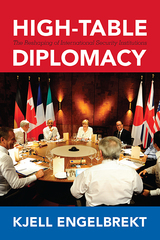
The proliferation of “minilateral” summits is reshaping how international security problems are addressed, yet these summits remain a poorly understood phenomenon. In this groundbreaking work, Kjell Engelbrekt contrasts the most important minilateral summits—the G7 (formerly G8) and G20—with the older and more formal UN Security Council to assess where the diplomacy of international security is taking place and whether these institutions complement or compete with each other.
Engelbrekt’s research in primary-source documents of the G7, G8, G20, and UN Security Council provides unique insight into how these institutions deliberate on three policy areas: conflict management, counterterrorism cooperation, and climate change mitigation. Relatively informal and flexible, GX diplomacy invites more countries to take a seat at the table and allows nontraditional security threats to be placed on the agenda. Engelbrekt concludes, however, that there is a continuing need for institutions like the UN to address traditional security problems.
High-Table Diplomacy will provoke discussion and further research on the role of minilateral summits among scholars of international relations, security studies, and international organizations.

The decade of the 1990s witnessed enormous changes in the international environment. The Cold War conclusively ended. Biotechnology and communications technology made rapid advances. Barriers to international trade and investment declined. Taken together, these developments created many opportunities for peace and prosperity.
At the same time, with the end of superpower domination, ethnically based intranational conflicts brought on widespread suffering. And while globalization expanded opportunity, growth, and incomes, it increased inequality of incomes and decreased human security. Moreover, as countries have become more closely linked, insecurity in one country has affected security in other countries.
READERS
Browse our collection.
PUBLISHERS
See BiblioVault's publisher services.
STUDENT SERVICES
Files for college accessibility offices.
UChicago Accessibility Resources
home | accessibility | search | about | contact us
BiblioVault ® 2001 - 2024
The University of Chicago Press









